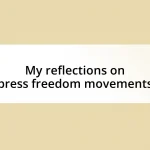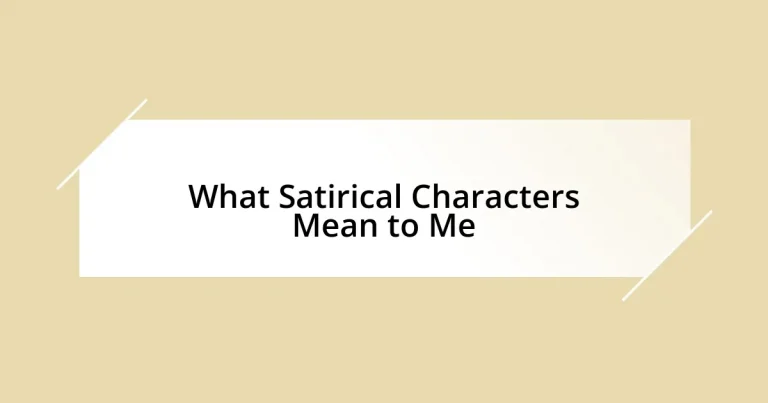Key takeaways:
- Satirical characters reflect societal flaws, encouraging self-reflection and dialogue about uncomfortable truths.
- Humor in satire can make serious discussions more approachable, helping uncover biases and stimulate critical conversations.
- Relatable characters highlight personal shortcomings, prompting growth and deeper understanding of societal issues.
- Satire serves as a catalyst for personal development and social advocacy, often inspiring action toward meaningful change.
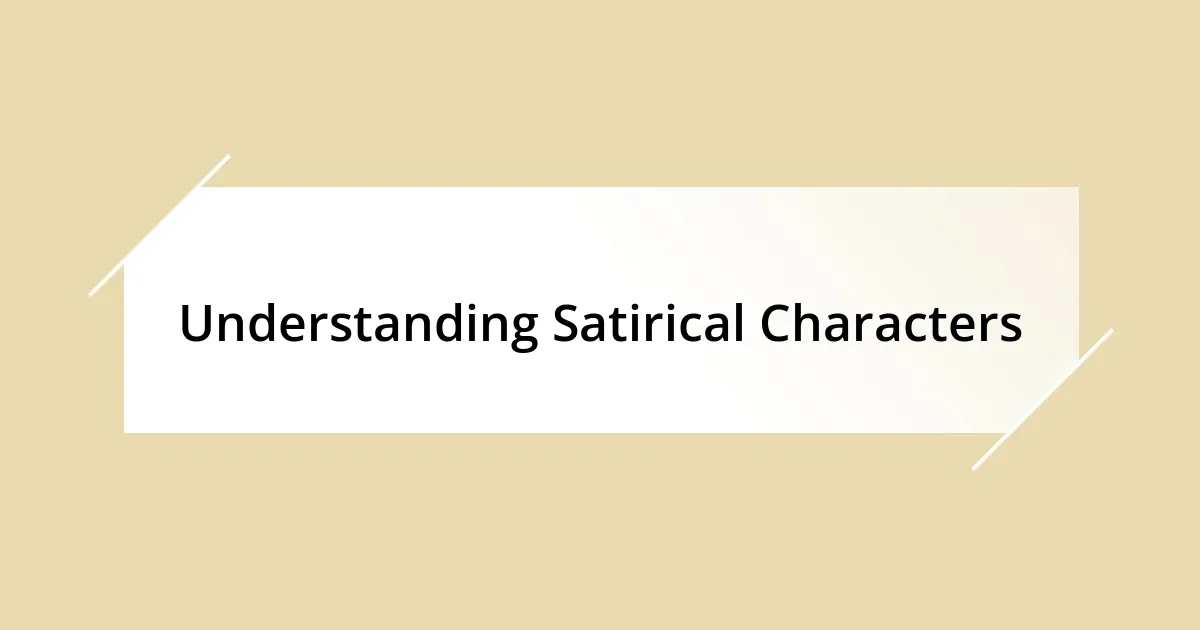
Understanding Satirical Characters
Satirical characters often embody the flaws and absurdities of society, serving as mirrors reflecting our imperfections. I remember watching a particular show where a character exaggeratedly represented bureaucracy, and I couldn’t help but laugh, albeit nervously. It made me think: do we rely on humor to face uncomfortable truths about ourselves?
These characters resonate with me because they push boundaries and challenge norms, allowing us to examine serious issues from a different perspective. I once found myself empathizing with a character criticized for their ignorance, realizing that, like many, I have blind spots in my understanding. It’s intriguing to ponder: how many of us are just a step away from recognizing our own folly through the lens of satire?
In my experience, iconic satirical figures often provoke thought and stimulate discussion, pushing us to question what is deemed acceptable in society. I recall debating the implications of a character’s outrageous behavior with friends—how it highlighted social hypocrisy we often overlook. Can satire not only entertain but also inspire change? This interplay between humor and insight continually captivates me, enriching my understanding of these characters.
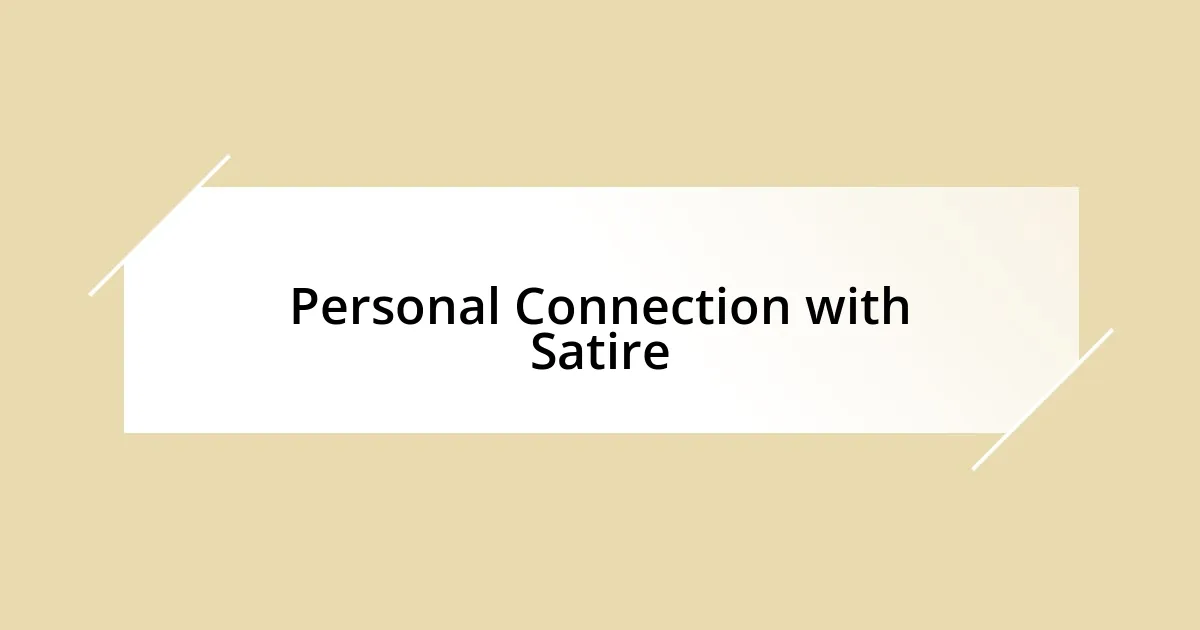
Personal Connection with Satire
Satire has a way of sneaking into my life, often without me realizing it. One personal experience stands out. I was at a family gathering when my relative made a joke about a popular political satirical character. Everyone erupted in laughter, yet beneath the laughter, I felt a mix of discomfort and relief. It struck me how satire can break the ice around tough topics, allowing us to address our differences without it feeling confrontational.
- Satirical characters can make serious discussions more approachable.
- Laughter sometimes serves as a coping mechanism for uncomfortable truths.
- They often help us uncover biases we didn’t know we had.
- Discussions sparked by satire can deepen our understanding of complex issues.
Through this lens, I see satire as a form of dialogue—not just with others but with myself. It forces me to confront my beliefs, sometimes prompting me to reevaluate my perspectives. I feel a sense of connection with the flaws portrayed in these characters, almost like they give voice to my inner conflicts. In a way, watching them is not just entertainment; it’s a journey into my own psyche.
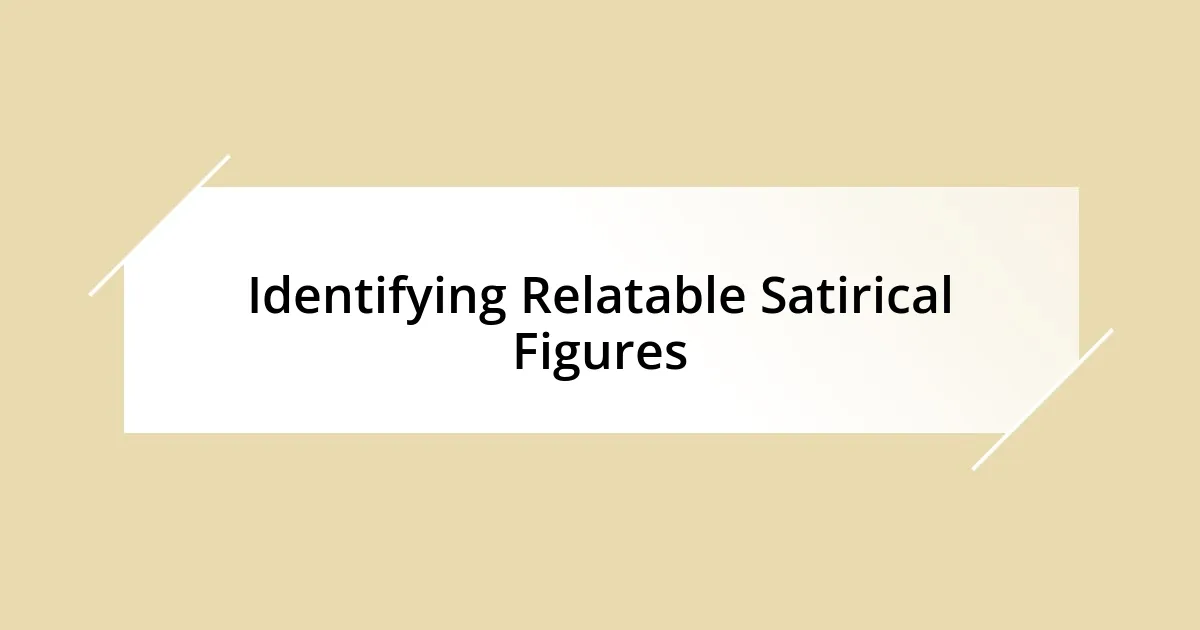
Identifying Relatable Satirical Figures
Identifying relatable satirical figures often begins with recognizing how they mirror our own experiences and emotions. I remember stumbling upon a character in a sketch comedy show who was hilariously over-the-top in expressing their frustrations with modern technology. As I watched, I couldn’t help but think, “That’s me when my Wi-Fi goes down!” These characters expose our trials and tribulations, making it easy to connect with their exaggerated responses. It’s fascinating how laughter can create a bridge to understanding our own frustrations.
The variety in satirical figures is vast, yet some resonate more deeply than others. For instance, I have always found characters like the bumbling politician relatable, often making decisions that reflect the irrationality I sometimes witness in real life. Their blunders remind me of the myriad ways we all stumble through life, sometimes in positions of power. It’s a humbling experience, isn’t it? Recognizing our own shortcomings mirrored in fiction can spur self-reflection and growth.
When I think about satire, I also realize that some figures are more challenging to relate to. Take, for instance, the hyperbolic activist character who seems endlessly motivated yet oblivious to their privilege. I’ve encountered moments that made me uncomfortable, as they highlight my own inaction toward significant issues. These characters, though less relatable, serve a critical purpose—they provoke thought and discussion, forcing me to confront the parts of myself I typically ignore. How many times has a character made me rethink my place in the world? It’s this dialogue between satire and reality that makes these figures so impactful.
| Type of Satirical Character | Relatability |
|---|---|
| Bumbling Politician | Very relatable, reflects real-life irrationality |
| Over-the-Top Tech User | Highly relatable, embodies shared frustrations |
| Hyperbolic Activist | Less relatable, but sparks vital conversation |

Lessons Learned from Satirical Characters
Reflecting on my experiences with satirical characters, I can’t help but feel a sense of realization that they serve as mirrors to our society. For example, during a debate about ethics in politics, I found myself referencing a comedic character known for making the most outrageous promises. As the room erupted into laughter, it became clear that such caricatures expose the absurdities we often overlook. They remind me that sometimes the best way to understand serious issues is through a chuckle, pushing boundaries without pushing away.
There are moments when I’ve watched a satirical show and felt an unexpected twinge of self-recognition. I remember a sketch where a character made a complete fool of themselves trying to impress everyone at a party. I laughed loudly, but then I wondered—have I ever behaved similarly? This blend of humor and discomfort is a lesson in humility, teaching me to acknowledge my flaws while finding solace in our shared human experience. How often do we forget that we are all hilariously flawed?
Then there are the instances when certain characters challenge my views head-on. I recall one where a satire pointedly addressed issues of privilege, portraying a character oblivious to their advantages. I found myself squirming in my seat, confronted by the question: “Am I doing enough to challenge my own biases?” It was an uncomfortable yet necessary moment for growth. These characters don’t just trigger laughter; they provoke thoughts that might otherwise stay buried, pushing me to engage actively with the world around me. After all, isn’t it essential to face the uncomfortable truths that satire often lays bare?
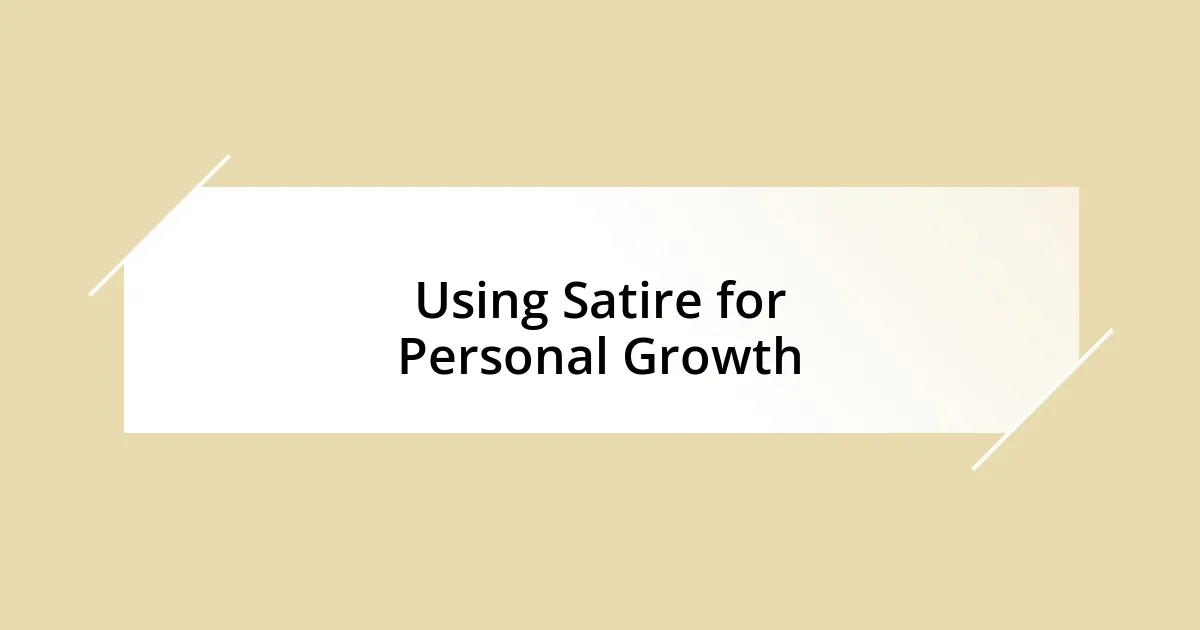
Using Satire for Personal Growth
Using satire for personal growth has been a fascinating journey for me. There was a time when I felt overwhelmed by societal pressures and expectations. After watching a hilarious sitcom episode featuring a character who overcompensated to fit in with the “in-crowd,” I couldn’t help but laugh at the absurdity. Reflecting on that moment, I realized I often let others dictate my choices—how liberating it felt to embrace my quirks instead!
Sometimes, satire nudges me to confront uncomfortable truths about myself. I remember watching a stand-up routine where the comedian riffed on the ridiculous lengths people go to appear perfect on social media. The laughter transformed into a moment of clarity for me. I thought, “Am I portraying an image that doesn’t reflect my reality?” This realization urged me to reduce my online presence, reconnecting with authenticity instead of projecting a curated version of myself.
I’ve also found that satirical characters inspire me to advocate for change. For instance, I once encountered a caricature of a self-important influencer who preached sustainability while driving a gas-guzzling SUV. The humor posed a provocative question: “What am I doing to genuinely contribute to the causes I care about?” This lighthearted taking of a swipe at hypocrisy pushed me into action, leading me to join a local environmental group. Satire isn’t just about laughter; it can spark the momentum for personal development and social awareness that some of us desperately need.






